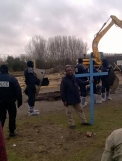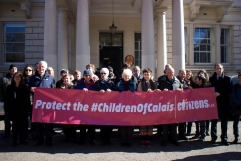"We ran away for a good life – where do we run to now?" The desperation in the voices of the nine Iranian men on hunger strike in the Calais refugee camp, nicknamed 'the jungle', is palpable. After 17 days of refusing food, their resolve has not withered. They tell me one of them went to hospital on Sunday after fainting for the third time but the medical team could not persuade him to eat.
I speak to six of the men down a crackly line to Calais and through a friendly interpreter called Sarwar.
They have been on hunger strike since 29 February after the demolition of homes in the southern part of the camp began. At least three of them fled Iran after converting from Islam to Christianity, an act punishable by death. They say their aim is that the evictions in the jungle stop until a viable, safe solution is found for all the refugees living there.
In spite of a court ruling on 25 February that residents of the Calais jungle could not be forcibly removed from their temporary shelters, the bulldozers soon moved in. The group of friends were threatened and physically forced from their homes, which were then destroyed. The shock and horror of this led them to take the drastic action to begin the hunger strike and for some of them of them to sew up their mouths.
On their blog, I read that when someone is sentenced to death in Iran and told they will be executed in a month, they sew up their mouths as a last form of protest before they die.
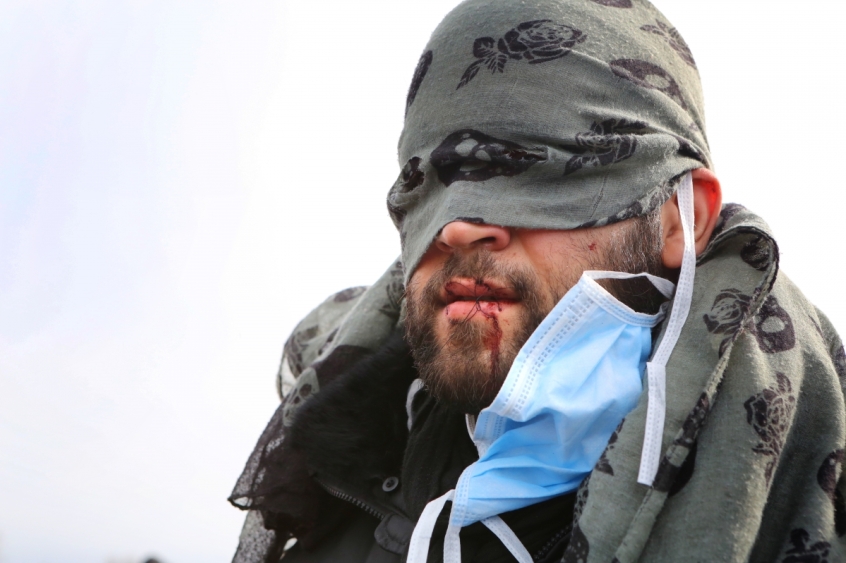
They were already exhausted from living in the camp, which they describe as 'hell on earth', but felt that there was no other way to bring the world's attention to the desperate situation which they and their fellow residents face.
Thousands of refugees, including hundreds of unaccompanied minors, now have nowhere to go apart from to new, smaller camps springing up across the Calais area where living conditions are reportedly dire. They fear that evictions due to start in the northern part of the camp will cause further chaos.
Omid (23) is particularly concerned for the families who are now extremely vulnerable: "We are doing this for the whole of the jungle. For all the women and children."
This protest is about more than their individual desires for asylum. Their plea is that all residents of the camp can live lives that are safe and free.
The men explain how they fled violence and abuse and came to Europe expecting to have their human rights respected, but this has not been the case: "Tear gas has been deliberately sprayed by police in the family areas where they know there are many children."
The police frequently fire rubber bullets. One middle-aged woman and her two children, including her teenage son, were handcuffed, thrown into a van and kicked onto the floor by the CRS, the French riot police. They were driven out of Calais before being thrown out and told to walk back to the jungle.
The level of police brutality the men have witnessed and experienced in the camp has deeply shocked them.
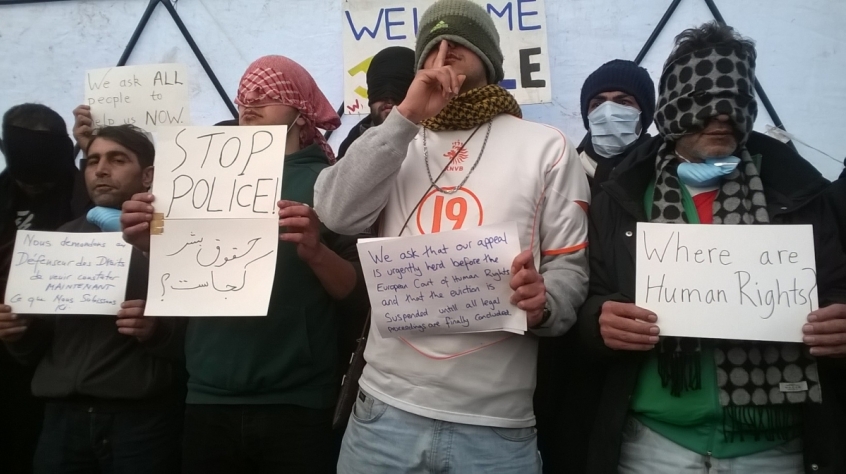
The police fire plastic bullets at them and say that if they don't like it they should go back home. However this is not an option for the Iranians: "If you convert to Christianity, you have no chance in Iran. If we go back, 100 per cent we will be killed."
Reza (24) says that the French police don't like him: "They kicked and beat me. They destroyed my shelter."
They also tell me they are scared to walk into the town because of threats and violence which have come from some of the residents of Calais. There have been a number of local protests against the camp and reports of refugees being beaten up when they step out of the jungle.
The men are now all sleeping in Jungle Books, the camp's colourful library, which has become a centre of information and one of the few areas where people can get on the internet or charge their mobile phones so they can contact families at home.
Hossiin (37) was imprisoned in Iran for converting to Christianity from Islam. After being granted parole, he ran away: "This is a hard, risky life. When I came here they did not believe I had converted and was a Christian because it could not be proved. Why else would I run away from my country?"
Moktar (35) says: "We are used to living in a country where religion is used as a tool of discrimination."
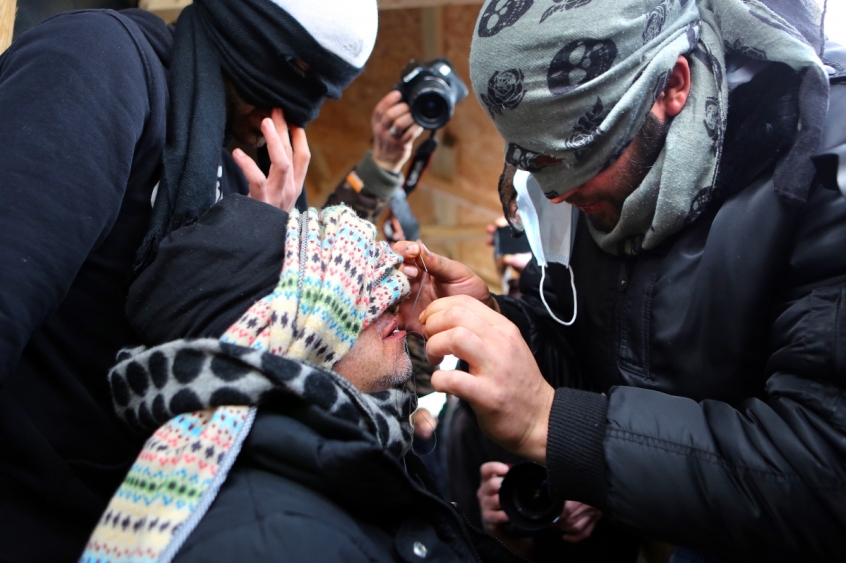
Part of their disillusionment comes from the fact that they believed they were coming to a Christian continent which would protect them.
They express their utter devastation as they watched the Protestant church and Kurdish mosque be torn down. The court order had promised these communal areas would be protected, but just a week later they were destroyed. "How can a Christian country destroy a church? Why did no-one stop it? Why did no French Christians come to stop it happening?"
One of the strikers is considering converting to Christianity but appeals to Christians to come and fight for him in the camp, then he says he will believe.
When asked what message they would bring to Christians in the UK, they say: "We are asking them to put pressure on the government to find a solution for the people in the jungle."
Omid says: "Show me what it means to be a Christian. We are brothers and sisters. We are no different. We are equal in front of God. We want to be treated the same. We are human beings."
They ask for Christians to pray wholeheartedly into this horrible situation.
"Jesus Christ sacrificed his life for humanity. We are following his example. We are struggling to do the same for these helpless people."
Tom Radcliffe (49), a British volunteer who had been living in a caravan next to one of the Iranians since September, initially joined the hunger strike for the first nine days as an act of solidarity and friendship. He tells me that the strike has now become more of a spiritual than political act as the men have begun to lose hope of any political solution.
"There is a fearlessness about them which some people in the West might find difficult to understand, even Christians, because we have such a materialistic world view. As some of them are recent converts they have a very strong faith and sense of the afterlife.
"It is a powerful act to choose to become a Christian in Iran because it is against the law. They are gentle, kind men but they have a powerful conviction. It is faith which has driven them out of their homeland. They have come from a cruel to a hopeless situation. They are now appealing to God and placing their trust entirely in him. That kind of faith can feel intimidating."
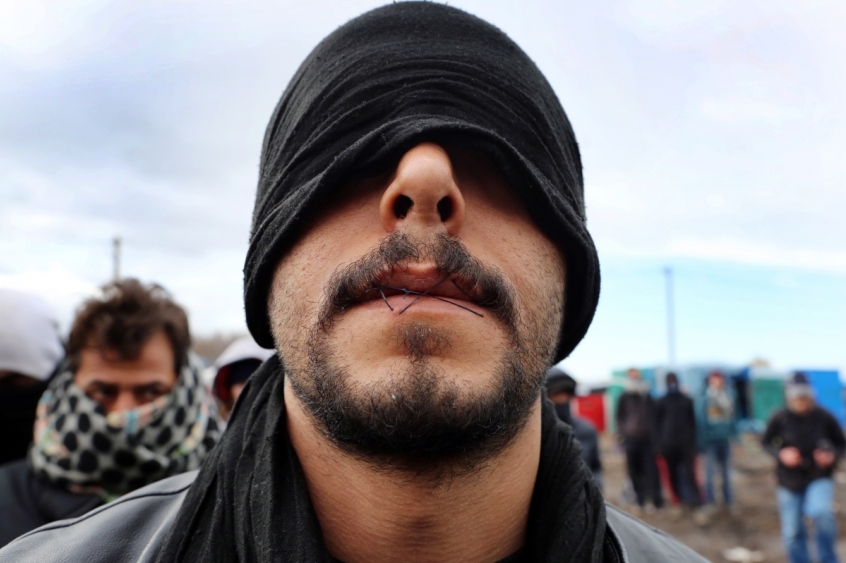
The hunger strikers are clear that they will carry on their protest if their health begins to deteriorate, even if it costs them their lives. Yet Hossiin seems to hold out hope for a better life one day: "I want to live where people do not watch me all the time and ask what I am doing. I want to live in freedom. I hope one day I can live as a normal person."
Their resilience and faith bring a challenge to all Christians, spiritually and politically. When I visited the camp in October, I saw how the residents had created a vibrant community out of almost nothing, including shops, cafés and places of worship. Although the living conditions were bad there was a sense of hope and possibility.
One winter and six months later, with much of what was created now destroyed, the feeling is more urgent. Throughout this call the men cry out: "Show me, show me". It is a petition for someone to listen and respond to them, perhaps even a cry to God to hear their suffering. Certainly it is a plea for their Christian brothers and sisters to speak up and act on their behalf.
They believe that words and resolutions have failed, that the law has abandoned them. Stateless and homeless, they are looking for action, for solutions. Tom concludes by offering this appeal: "When I needed a neighbour, were you there, were you there? And the creed and the colour and the name won't matter. Were you there?"
You can read more about the hunger strikers on their blog.
More than 100 major public figures including Meryl Streep, Jim Broadbent, Idris Elba and several bishops have written an open letter to David Cameron. Join them in calling for the Prime Minister to ensure that refugee children from Calais are protected










